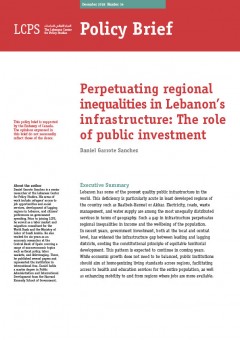|
|
 |
 PDF
December 10, 2018 | English | Daniel Garrote SanchezPerpetuating regional inequalities in Lebanon’s infrastructure: The role of public investmentLebanon has some of the poorest quality public infrastructure in the world. This deficiency is particularly acute in least developed regions of the country such as Baalbek-Hermel or Akkar. Electricity, roads, waste management, and water supply are among the most unequally distributed services in terms of geography. Such a gap in infrastructure perpetuates regional inequalities in income and the wellbeing of the population. In recent years, government investment, both at the local and central level, has widened the infrastructure gap between leading and lagging districts, eroding the constitutional principle of equitable territorial development. This pattern is expected to continue in coming years. While economic growth does not need to be balanced, public institutions should aim at homogenizing living standards across regions, facilitating access to health and education services for the entire population, as well as enhancing mobility to and from regions where jobs are more available. PDF
December 10, 2018 | English | Daniel Garrote SanchezPerpetuating regional inequalities in Lebanon’s infrastructure: The role of public investmentLebanon has some of the poorest quality public infrastructure in the world. This deficiency is particularly acute in least developed regions of the country such as Baalbek-Hermel or Akkar. Electricity, roads, waste management, and water supply are among the most unequally distributed services in terms of geography. Such a gap in infrastructure perpetuates regional inequalities in income and the wellbeing of the population. In recent years, government investment, both at the local and central level, has widened the infrastructure gap between leading and lagging districts, eroding the constitutional principle of equitable territorial development. This pattern is expected to continue in coming years. While economic growth does not need to be balanced, public institutions should aim at homogenizing living standards across regions, facilitating access to health and education services for the entire population, as well as enhancing mobility to and from regions where jobs are more available.
|
|




